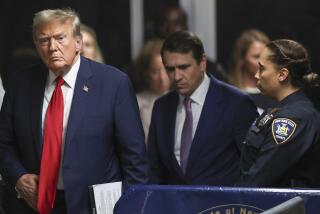Bradley Manning not guilty of aiding the enemy in WikiLeaks case
- Share via
FT. MEADE, Md. -- Army Pfc. Bradley Manning was acquitted Tuesday of the most serious charge in the largest breach of classified U.S. secrets in the nation’s history, possibly escaping a life sentence after being vilified for more than three years as a traitor to his country but championed by others as a hero whistle-blower who released proof of government misconduct in the wars in Iraq and Afghanistan.
Army Col. Denise Lind found Manning not guilty of giving intelligence to the enemy, but convicted him of espionage and other charges after deliberating the case on Friday evening, Sunday and Monday. Her decision brings to a close a nearly two-month military court-martial that raised a national debate over the nature of journalism and whistle-blowing versus the prospect of someone betraying his country.
PHOTOS: Famous document leakers
The 25-year-old Manning still could receive a lengthy prison sentence, however, after earlier pleading guilty to 10 lesser charges of mishandling classified data for giving more than 700,000 classified documents to the anti-secrecy organization WikiLeaks.
Military prosecutors had argued the soldier knew full well that the secret State Department cables, combat videos and terror detainee assessments would be obtained by Al Qaeda and other terror groups once WikiLeaks posted them on the Internet. They put on key evidence and testimony that showed Manning underwent extensive training about safeguarding classified data before he became an Army intelligence analyst in Iraq, and that he instructed other soldiers, too.
“He was a traitor, a traitor who understood the value of compromised information in the hands of the enemy and took deliberate steps to ensure that they, along with the world, received it,” Maj. Ashden Fein, the chief prosecutor, told the judge.
But Manning’s defense lawyers, led by David Coombs, insisted Manning was just a small-town youth from Oklahoma who joined the Army with good intentions, only to become deeply bothered by what he discovered about alleged government misconduct that he felt was important for the rest of the world to see.
They portrayed him as a whistle-blower, and have left open the possibility that he take the witness stand during the sentencing phase to explain his views.
In February, when he pleaded guilty to the lesser charges, he said in a lengthy statement that after collecting data on the wars in Iraq and Afghanistan he had grown “depressed with the situation we had become mired in year after year.”
ALSO:Vandal splashes paint at National Cathedral; woman arrested
NPR’s Scott Simon: A vigil for his dying mother, tweeted with love
Poll has N.Y. mayoral hopeful Weiner in 4th place among Democrats
More to Read
Sign up for Essential California
The most important California stories and recommendations in your inbox every morning.
You may occasionally receive promotional content from the Los Angeles Times.











